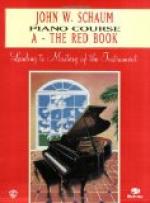“The subject of forming a repertoire is one often overlooked or not understood. The repertoire should be comprehensive and built on broad lines. A pupil intending to make music a profession should know the literature of the piano, not only the small and unimportant works of the great composers (as is too often the case), but the big works as well. If one is well grounded in the classics at an early age, it is of great benefit afterwards.
POWER AND VELOCITY
“For gaining power, heavy chords are very beneficial; combinations of five notes that take in all the fingers are most useful.
“The principle of velocity is the doing away with all unnecessary movement—raising the fingers as little as possible, and so on. But in early stages of study, and at all times for slow practise, exactness and clearness, the fingers must be raised, Leschetizky is a great believer in finger action; he holds it to be absolutely necessary for finger development.
“I have been concertizing for the last three years, and studying alone. This does not mean I have learned all the masters can teach, but only that I have come to a place where I felt I had to go alone, that I must work out what is in me. No master can teach us that; we have to find ourselves alone.
“I shall probably play considerably with orchestra next season. There is a Concerto by Rimsky-Korsakow which is quite short, only one movement. It Is charming and brilliant, and I think has not yet been played in America. There is also a new work by Stavenhagen for piano and orchestra, which is a novelty on the other side. I greatly enjoy playing with orchestra, but of course I shall play various recitals as well.”
Miss Spencer has appeared with the best orchestras in England and on the continent, and has everywhere received commendation for her pure, singing tone, plastic touch, and musical temperament. She is certain to have success in America, and to win hosts of friends there.
XX
ARTHUR HOCHMAN
HOW THE PIANIST CAN COLOR TONE WITH ACTION AND EMOTION
“A pianist, like a painter, should have an infinitude of colors on his palette,” remarked Arthur Hochman, the young Russian pianist, in a recent chat about piano playing. He should paint pictures at the keyboard, just as the artist depicts them upon the canvas. The piano is capable of a wonderful variety of tonal shading, and its keys will respond most ideally to the true musician who understands how to awaken and bring forth all this tonal beauty from the instrument.




